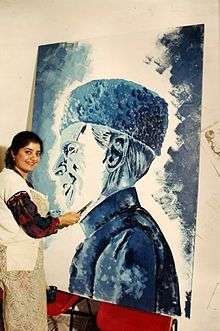Nigar Nazar
Nigar Nazar (born 1953) is the first Pakistani female cartoonist.[1][2] Her character Gogi is an urban Pakistani woman struggling with her frailties in the context of sexist social norms. The character was created to educate people about social and educational advocacy problems.[1][3] She is the chief executive officer of Gogi Studios. Between 2002 and 2003, she was a Fulbright Professor at the art department of the University of Oregon.[4][2][3]
Nigar Nazar | |
|---|---|
 Nigar Nazar | |
| Born | 1953 (age 66–67) Karachi, Pakistan |
| Nationality | Pakistani |
| Known for | Cartoonist |
Notable work | Gogi (cartoon) |
| Website | www |
Biography
Nigar changed her degree from medical to fine arts in 1968. Her cartoon Gogi appeared for the first time in 1970 in Karachi's Institute of Arts and Crafts annual magazine.[1] She graduated in fine arts from the University of the Punjab, Lahore.[5] She also attended courses at the Australian National University, Canberra.[5]
In 2002–2003, she was a Fulbright scholar at University of Oregon art department, and in 2009, she was a Fulbright Visiting Specialist at Colorado College.[6] She attended a UNICEF-sponsored training session on animated film at Hanna-Barbera Studios in Manila.[7]
Gogi Studios works on projects that actively address social issues.[1] In 2009, Nazar completed five "awareness comics on burning social issues such as extremism, corruption, sectarian violence, girls education and women rights".[1] Three books which are a compilation of her cartoons have been published, as well as several calendars, brochures, diaries, and posters. In collaboration with non-governmental organisationss, 12 public-transport buses were wrapped with Gogi cartoons in 2004 to convey social messages.[8] She has produced for various international NGOs three books for children on health and hygiene, the environment, disaster management, first aid, and child safety.
Now living in Islamabad, Nazar says, "My work ... started from newspaper and reached the community, as it appeared on public buses and hospitals. I published books and comics and the aim of my studio is to address mindset for a positive change."[9]
She is a founding member of the Asian Youth Association for Animators and Cartoonists, headquartered in Guiyang, China.[1] She has been an official speaker and jury member of numerous art and cartoon competitions, both international and national such as the APACA (AYAAC), Aydin Dogan Vakfi (Turkey), Himal Cartoon Conference (Nepal), Cartoonists Congress (Malaysia/Singapore), and the Oxfam Congress for Women's Issues (Sri Lanka). Nazar has conducted many workshops and outreach programs for privileged and underprivileged students in Pakistan.
Gogi
Nazar's main cartoon character, Gogi, has been a popular comicstrip in newspapers worldwide. Gogi depicts a modern Pakistani Muslim woman with short hair, long eyelashes and a polka dot dress.[10] Asked in an interview to describe Gogi, Nazar said, "In the words of a university student who has done a well-researched thesis on my work, 'Gogi is the symbol of womanhood in Pakistan, with all her adventures and escapades in daily life, facing day to day hypocrisies in a male dominated society "[11] The Denver Post described Gogi as "a bit like 'Blondie' and a bit like Oprah—except devoutly Muslim".[12]

Honours
Nigar was featured in the Wateen Telecom Pakistan "Icon 2010 of Pakistan" calendar. The Cartoonists Rights Network named her first among innovative users of cartoons. She received the Mohtarma Fatima Jinnah Award from the government of Pakistan.[14] She received the Booruker UNESCO prize in 1997 for her work at an orphanage in Kyrgyzstan.[15] BBC nominated her for Hundred influential Global women who brought about a difference in the world, she has been voted among "50 Power Women" nationally by The News (Daily news paper.)
Projects
- Trauma counselling of earthquake victims through puppets
- Nigar devised Puppet Shows weaving elements of Trauma Counseling in the script for Earthquake victims (October 2005) Gogi comic strip characters entertained and conducted Trauma Counselling in an innovative and impactful way.
- Outreach Programs and lectures (January 2008 – December 2009)
- Nazar conducted outreach programs in Islamabad, Rawalpindi and Lahore on environmental subjects. She showed animated cartoons, demonstrated the art of drawing cartoons, interacted with children, and distributed free Gogi books and stationary in Gogi school bags to the attendees.
- Workshops (2008–2010)
- Nazar conducted numerous cartooning workshops for children, especially those from disadvantaged communities, with the international non-governmental organisations PLAN, HEC (Higher Education Commission), National Government/CARE and Shaj-re-Ilm. Workshops were also organised with private organisations, such as KFC, for children.
Cartooning workshop were conducted by Nigar Nazar for Karachi University, NUST and Gymkhana Lahore. Courses in drawing and cartooning were conducted in Fatimah Jinnah University.
Publications
- Glad to Meetcha Gogi, Adam Publishers (Malta), 1975.[16]
- Gogi on the Go, Pak-American Publishers, 1982.[16]
- Koorey ka Jin (English: The Garbage Monster),including a board game, 2005.
- Prepared training modules for HIV/AIDS, for Pakistan's health ministry, 1987.[16]
- Designed and authored a baby-record book published by Ferozsons Laboratories in 2006.
- Prepared and illustrated two books on disaster management in 2006 (a JICA project).
- Collection of comic strips Going Gogi published in 2009; later translated to Urdu.
- January 2010: produced five comic books on life skills: girls' education, corruption, anti-recruitment, women's rights, and sectarian violence.
- Babloo: The Little Boy who didn’t like Books! (2014) ISBN 0199065845
References
- Kapadia, Faisal (12 April 2010). "A reason to smile". Dawn. Dawn Media Group. Retrieved 17 July 2011.
- The Muslim World’s First Female Cartoonist
- Educating with Cartoons - Nigar Nazar Promotes Freedom with a Smile
- "Nigar Nazar | Pride of Pakistan | Film & TV | PrideOfPakistan.com". prideofpakistan.com. Retrieved 28 January 2018.
- "From FP's Desk". Financial Post. Qudsia Kahn. 30 October 2006.
- "Female Muslim Cartoonist to Teach, Exhibit Artwork at Colorado College" (Press release). Colorado Springs, CO: Colorado College. 23 September 2009. Archived from the original on 18 July 2012. Retrieved 17 July 2011.
- "Artwise: Nigar Nazar—Gogi: looking at humour in art". Tapestry. Jang Group. 1 May 2008. Archived from the original on 29 September 2011. Retrieved 17 July 2011.
- Sitain, Momina (11 June 2011). "Drawing awareness: Animating cartoons with conscience". The Express Tribune. Karachi, Pakistan: Lakson Group.
- Akens, Kirsten (8 October 2009). "Gogi power". Colorado Springs Independent. Colorado Springs, CO: John Weiss. Retrieved 17 July 2011.
- Tamimi, Iqbal (18 December 2009). "Muslim Women Find Expression Through Cartoons". London Progressive Journal. ISD Media. Retrieved 17 July 2011.
- Nazar, Nigar (28 June 2010). "Interview: Nigar Nazar CEO, Gogi Studios". Newsline (Interview). Interviewed by Siham Basir. Retrieved 17 July 2011.
- Draper, Electa (17 October 2009). "The Pioneer: Nigar Nazar, lecturing this month at Colorado College, has proved over 40 years that a cartoonist's pen is a mighty voice". The Denver Post. Denver, CO. p. B-01.
- "Docu on first female cartoonist". Daily Times. Lahore, Pakistan: Shehryar Taseer. 26 March 2008. Retrieved 17 July 2011.
- Raza, Raheel (7 December 2007). "Nigar Nazar's Career". The Star. Toronto. Retrieved 17 July 2011.
- "Nigar Nazar's career". The Star. 7 December 2007. Retrieved 26 May 2020.